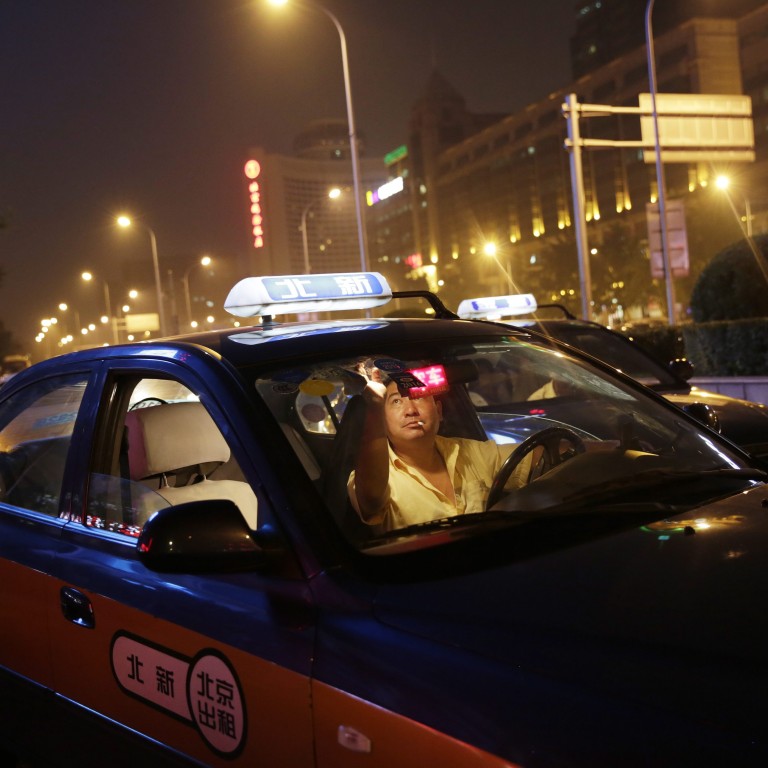
Didi Kuaidi grabs China's first internet car-booking licence from Shanghai while rival Uber sets up local company in city's FTZ
China’s market-leading car-hailing app Didi Kuaidi and its chief rival Uber both announced on Thursday their respective plans to expand on the mainland, signalling tougher competition in the years ahead.
Didi Kuaidi, which is backed by Chinese internet giants Tencent and Alibaba, said in Shanghai it had received China’s first internet car-booking licence from the Shanghai Municipal Transportation Commission (SMTC).
READ MORE: Two can play this game: Hong Kong taxi drivers to launch luxury fleet and app to take on Uber
This means the company has become the first legally authorised operator of an online private car booking platform in China.
“The Shanghai internet car-booking licence is the first of its kind in China, as well as globally,” said Cheng Wei, Didi Kuaidi’s CEO.
“It is a landmark moment in the development of China’s urban transportation and mobile internet. This new ‘Shanghai model’ engages both regulatory bodies and the private sector to create an effective solution to urban commuting challenges.”
Didi Kuaidi has been on a mission recently to make deals with major US companies and Uber's rivals in some of its chief markets in a bid to further spread its wings.
In August the start-up, which was created in February via a merger of China's top two rival car-hailing apps and is now valued at around US$16 billion, announced plans to invest in Indian taxi service provider Ola and Southeast Asia's Grabtaxi.
All such moves come after a sustained backlash against private car- and taxi-hailing apps in China this year from established taxi operators.
This led to a government crackdown on the offices of Uber and Didi Kuaidi and compelled the government to order such apps to fall in line with the relevant regulations within a fixed deadline.
The SMTC confirmed Didi Kuaidi’s news at a forum co-organised by the China Internet Society and the car-hailing app. By mid-afternoon, none of its rivals in China, including Yongche.com and Zuche.com, had received the same permit.
READ MORE: Travis Kalanick, the fall and spectacular rise of the man behind Uber
SMTC director Sun Jianping said the licence is also available for foreign car-hailing apps like Uber as long as they abide by Chinese law.
However, Uber lacks the required internet content provider ICP licence at present, Sun added.
Earlier in the day, Uber said it has set up a company in the China (Shanghai) Pilot Free Trade Zone - which is being used to experiment with economic and other reforms - called Wubo Information Technology. Wubo sounds like the Chinese pronunciation of Uber.
Uber’s vice president of finance Axel Martinez will be its legal representative in Shanghai, and it was established to make Uber’s services more localised, Uber said.
Wubo, which has registered capital of 2 billion yuan (US$314.8 million) is Uber’s only non-affiliated company outside the US. Uber expects it to attract a further 4.3 billion yuan in investment in the near future, it said.
Uber’s founder Travis Kalanick said in an email to investors in June that China was the company’s "number one priority" and that its drivers were completing almost 1 million trips a day in the country. Reports claim that three Chinese cities are among the company’s most lucrative worldwide.
Meanwhile, Didi Kuaidi said in its statement Thursday that it earned the new private car licence by meeting all of the criteria set by the authorities.
Apart from the ICP licence, it was required to have all of its servers located in China, the world’s biggest internet market, and all data protection protocols must fall in line with Chinese law. Moreover, it had to comply with regulations pertaining to the screening and certification of drivers and vehicles.
The latest move comes amid growing competition between Uber and didi Kuaidi, which have both pledged more than US$1 billion to grow their businesses on the Chinese mainland in recent months.
Didi Kuaidi controls over 80 per cent of the car-hailing market there but Uber and other rivals are gaining traction.
The two firms are spending heavily to subsidise rides and gain market share, betting on China’s internet-linked transport market becoming the world’s biggest and most lucrative.
China has responded by cracking down on the apps, with police raiding Uber’s offices in Sichuan’s Chengdu and Guangzhou in May, and several municipal governments, like Guangzhou, Shenzhen and Beijing, declaring their services illegal this year.


